July 2020 1st Edition
July 2020 1st Edition Joy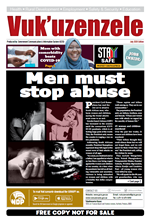
Translations
Books give homeless people a happy ending
Books give homeless people a happy ending vuyelwanHomeless people in Durban are getting off the streets, thanks to a project that enables them to sell second-hand books to earn an income.
Booksellers of Mzansi is a partnership between the Denis Hurley Centre and Micromega Publications. Second-hand books are given to homeless people in Durban, who then sell them to make a profit.
Richard Nzima is one of these booksellers. He moved from Mpumalanga to Durban after being offered a job but soon discovered that he had fallen victim to a scam.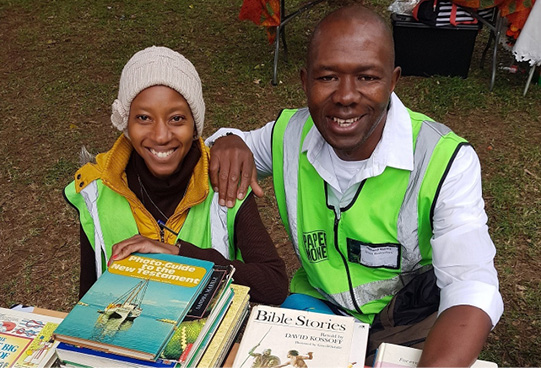
“For three-and-a-half months, I was on the street. This is until I went to the Denis Hurley Centre, where social workers told me about some job opportunities. I was given some books to sell and on my first day, I made R450,” says Nzima.
Nzima saw an opportunity to earn a continuous income from selling books.
“It requires little money to start off and you see the results immediately. I approached shopping malls and now I have four malls where I can sell my books. I set myself a target of selling at least 10 to 20 books per day to earn a good income.”
Since he started selling books, Nzima has managed to get off the streets. He now has enough money to rent a room and to afford meals every day.
“Sleeping on the streets steals your dignity. This project has given me my self-esteem and confidence back.”
During levels 5 and 4 of the lockdown, when the sellers were unable to sell in their usual spots, the booksellers were given the chance to sell their books online, with the help of Anivesh Singh, who owns e-commerce site Made in Chatsworth.
“The sellers were able to continue earning an income through lockdown. Even though many of them are now able to go back to their normal places to sell books again, we are continuing to support them by listing their books online,” says Singh.
*If you know of a homeless person who you think could become a bookseller in the Durban area, contact the Denis Hurley Centre at 031 301 2240.
Photo credit: Illa Thomson
COVID-19 school safety guidelines
COVID-19 school safety guidelines angenithaThe Department of Basic Education (DBE) has put safety regulations in place for schools, to curb the spread of the coronavirus disease (COVID-19).
The measures are meant to protect teachers, parents and learners and include using personal protective equipment and ensuring social distancing and regular hand washing or sanitising.
Schools must also educate teachers and learners about COVID-19, including how it is spread and its symptoms, says DBE spokesperson Elijah Mhlanga.
“Every person who enters or leaves a school must wash their hands or sanitise them, at the gate, using hand hygiene stations equipped with soap and water or a 60 percent alcohol-based hand sanitiser,” he adds.
The guidelines state:
- How and when schools should be cleaned.

- Cleaning products must be consistently available.
- That pens and pencils must not be shared amongst learners or teachers.
- Food and eating utensils may not be shared.
- Social distancing must be adhered to at all times.
- Classrooms must be well aired.
- Classrooms must be cleaned at least twice a day with disinfectant.
- Every person who enters a school should have their temperature checked with a digital thermometer scanner.
- All classrooms and offices must have a portable handwashing station, in the form of tippy taps, soap or hand sanitiser.
- A litter bin with a liner must be used in every classroom to throw away tissues, paper towels and other waste.
“Every person who enters a classroom must wash their hands with soap and water or sanitise their hands. They must do this again when leaving the classroom. Protective face masks must be worn at all times in classrooms,” says Mhlanga.
Schools that provide food through the National School Nutrition Programme must make sure that the food preparation area’s surfaces are cleaned daily with disinfectant and wiped with a 70 percent ethyl alcohol-based cleaner between daily cleanings.
“Learners should eat their meals in the classroom, under the supervision of an educator. Staggered serving times should be considered to prevent queuing in the kitchen.”
A safe environment can be achieved by removing infectious particles in the air and on surfaces, by always adhering to the rules, says Mhlanga.
Drones ensure service delivery
Drones ensure service delivery vuyelwanMunicipalities in South Africa are taking advantage of the potential of drones to improve service delivery, while cutting costs.
Mpumalanga’s Gert Sibande District Municipality has trained drone pilots, who are ready to take to the skies to improve service delivery.
“The municipality observed that there are cheaper, safer and faster methods of performing day-to-day functions through the use of drones,” says municipal spokesperson Bongi Ka Dube. 
“They can be used for the assessment of infrastructure, monitoring of greenhouse gas emissions, community safety purposes, land surveillance and many other things,” he adds.
Ka Dube believes municipalities should always look to technology to enhance their operations.
“The world is transforming to the science of big data and the Fourth Industrial Revolution. This is changing the way things are done, including the performance of municipal functions. Research is critical in understanding how drone technology or any other technological advancements can assist municipalities in executing their functions,” says Ka Dube.
In Limpopo’s Greater Tzaneen Local Municipality, drones were used during the coronavirus (COVID-19) lockdown to educate residents about the virus. The municipality used an external drone operator to deliver key messaging from the mayor about COVID-19, via loudspeakers which were attached to the drone.
Delivered in the most commonly-used languages in the area, the messages included reminders about social distancing and regular hand washing. Municipal spokesperson Neville Ndlala said the drones enabled the municipality to quickly reach areas that were difficult to access.
“We wanted to send important safety messages and capture footage. Drones enabled us to reach areas that are normally difficult to access and to broadcast messages to people who were unaware of or simply ignored government’s messages. They also enabled us to ensure compliance with the regulations.”
The municipality will continue to explore the use of drones after the lockdown. “We see great potential for drones to help with combatting and preventing crime, and collecting important geographical and environmental management information.”
The Gauteng Department of Infrastructure Development is also using drones to monitor important construction projects. “When we came up with this project, we were looking at how we could deliver in a timeous, cost-effective and more efficient manner,” says Amanda Moletsane, chief director of the infrastructure and planning division.
Entrepreneurs produce cheaper nappies
Entrepreneurs produce cheaper nappies vuyelwanThree entrepreneurs has pened their own nappy business.
The business of manufacturing quality disposable nappies is one that not many black South Africans have considered. In fact, it is dominated by other races.
This is what Shane Ngwenya, Tiyani Khoza and Hanyane Mangwani discovered when they started researching the baby care industry over 10 years ago.
Ngwenya (35), from Pongola in KwaZulu-Natal, takes Vuk’uzenzele along the journey of their emerging baby diaper business. 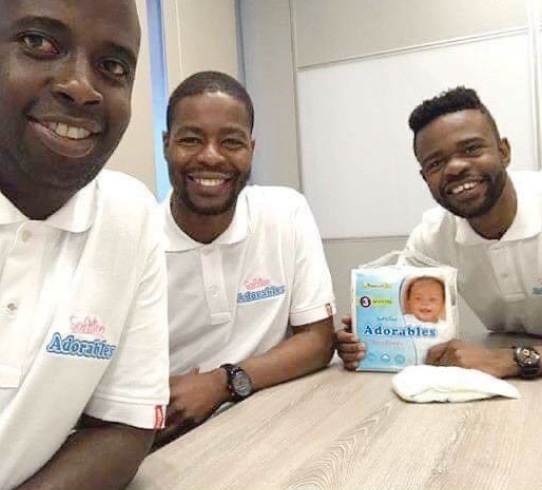
“It took about 10 years to conceptualise our business, but we officially got it off the ground about two years ago. That is when our company, Softline, was born,” he says.
The three business associates thought it wise to venture into the market after realising that not many black people were in the industry and that many households in township and rural areas could barely afford premium baby diapers.
“The idea was to produce a good quality product at an affordable cost, for black communities especially. We then launched our diaper brand Adorables,” he explains.
He adds that the diapers are manufactured with the consideration of babies’ comfort in mind. Although the company is outsourcing manufacturing services, Ngwenya says it is in talks with government to assist with funding so that it can buy machinery to manufacture its own nappies.
“We are currently contracting a diaper manufacturing company to produce our brand,” he confirms.
In its two years of operation, the company has signed deals with various distributors across the country, bringing the product to many South African homes.
“Roughly, we have managed to create over 100 direct and indirect jobs in the country because our distributors also rely on our product to hire people in their own companies,” he says.
Customers also place their orders directly with Softline.
“In the near future, we would like to venture into exporting our product to other African countries because we believe citizens can afford to buy it,” he adds. Ngwenya says the most important aspect of Softline is value for money.
Exam prep at the click of a button
Exam prep at the click of a button angenithaA government-subsidised laptop is enabling a first-year university student to adapt to remote learning and forge ahead with her qualification.
Pretty Zikho Nogwaja (22) of Germiston in Ekurhuleni says receiving a laptop from the National Student Financial Aid Scheme (NSFAS) will assist her in preparing for her mid-year examinations.
She is a first-year student at the University of South Africa and is studying towards a Bachelor of Arts in Community Development. 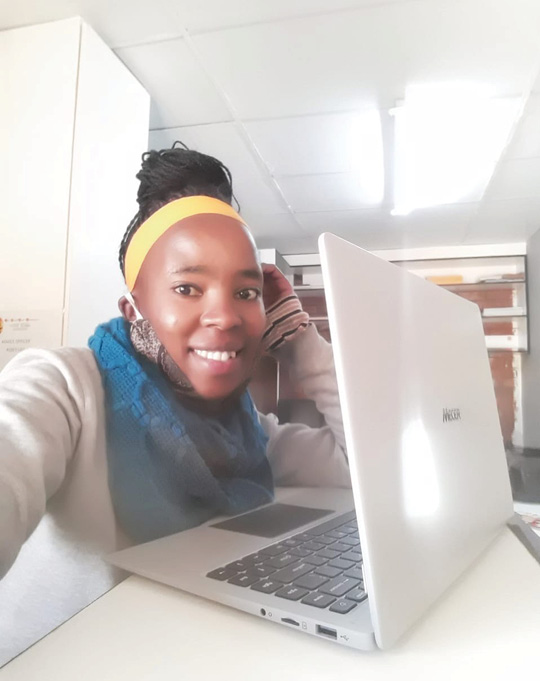
When the coronavirus (COVID-19) hit the shores of South Africa and started spreading nationwide, students were instructed to stay at home as part of measures to curb the spread of the pandemic.
Minister of Higher Education and Training Blade Nzimande announced that public universities and colleges would work with NSFAS to ensure that the scheme’s beneficiaries receive electronic devices to enable remote learning.
Fortunately, Nogwaja had initially indicated in her application to NSFAS that she needed a laptop.
“In the application form, I had to choose between getting a book allowance or a laptop. I chose the laptop option because I knew I would need it to complete my assignments and I had no computer at home. So, I applied for the laptop from NSFAS before the lockdown,” she says.
She only received her laptop at the beginning of June and says the first few months of study were frustrating because she was forced to use her cellphone to study online material.
“It was difficult because the phone’s screen is small compared to a book or laptop,” she says.
Nogwaja also received 30GB of data from her university.
“The NSFAS bursary really helped me because I am able to further my studies. Had I not received the bursary, I would not have been able to continue studying after matric,” she says.
Minister Nzimande also announced that NSFAS and Funza Lushaka students would receive 10GB daytime and 20GB night-time free data for three months, starting from 1 June.
Nogwaja advises her fellow students to adapt to the new style of learning and try their best to use the resources that they are given to achieve academic success.
Students who have enquiries or complaints can call the Department of Higher Education and Training’s call centre at 0800 872 222, the NSFAS toll-free line at 0800 067 327 or World Skills South Africa at 086 999 0125.
Government prepares for COVID-19 spike
Government prepares for COVID-19 spike angenithaPreparations for a possible increase in COVID-19 cases are underway with the government and the private sector building field hospitals, purchasing personal protective equipmentand ensuring that South Africa manufactures ventilators.
South Africa’s coronavirus disease (COVID-19) cases are expected to increase in the coming weeks and government is working hard to ensure the health sector is ready.
“We have been buying personal protective equipment from across the world and supporting local companies to produce them here,” confirmed President Cyril Ramaphosa.
“We have been improving the infrastructure in hospitals, setting up temporary hospitals and finding more beds for COVID-19 patients,” he added.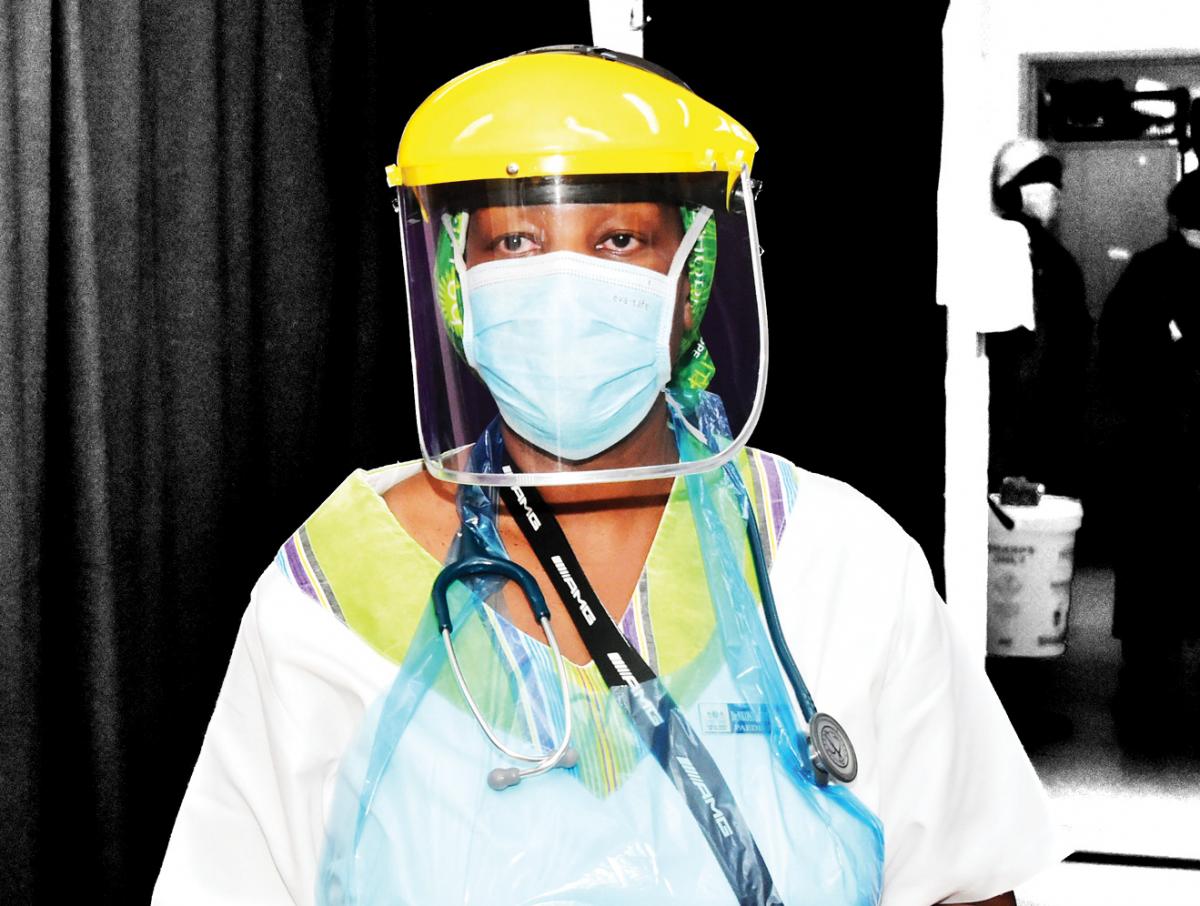
By the beginning of June, over 27 000 public hospital beds were put aside for COVID-19 patients. Once complete, field hospitals will have 13 000 beds.
Quarantine sites and field hospitals
Public Works and Infrastructure Minister Patricia de Lille said:
- 1 751 facilities have been marked for as proposed isolation sites, representing over 129 600 beds nationally, in all 44 districts and eight metros.
- 358 facilities have been identified in the Western Cape, representing over 27 500 beds.
- 395 facilities have been assessed by the Department of Health, representing 35 759 beds.
- 32 hospitals in the Eastern Cape, 19 in KwaZulu-Natal and 10 in Mpumalanga have been identified for renewal and repair as field hospitals.
- The Cape Town International Convention Centre, the biggest field hospital in the country, has 862 beds. It admitted its first 10 patients on 8 June.
- In the North West, teams are making hospitals bigger by building additional structures.
Gauteng ís state of readiness
Gauteng Premier David Makhura said the province has:
8 301 hospital beds available, cleared some existing hospitals and turned them into COVID-19 facilities, making 555 standard beds and 308 ICU beds available, made new permanent wards at Kopanong, Jubilee, Chris Hani Baragwanath and George Mukhari hospitals, adding 800 beds, and ensured the Nasrec facility has 500 new beds.
In May, Premier Makhura welcomed donations from BMW and Nissan to help build a field hospital in Rosslyn, Tshwane.
The Eastern Capeís field hospitals
In the Eastern Cape, a 1 000-bed field hospital has been created at Nelson Mandela Bay Stadium. Other stadiums are also being used as quarantine facilities and field hospitals, including Cape Town Stadium and FNB Stadium.
The German government and Volkswagen have pledged R107 million for the building of a field hospital in Port Elizabeth. When the hospital is ready to receive patients, it could accommodate 4 000 beds.
Ventilators
South Africa has, with the help of various governments, companies and foundations sourced significant quantities of personal protective equipment of personal protective equipment, medical supplies and ventilators.
A medical ventilator is a machine that helps the lungs to function. It is used for patients who have trouble breathing. Patients who have COVID-19 have difficulty breathing. Government launched the National Ventilator Project in April, to build more local machines due to a global shortage. It is hoped that production will start this month and government is hopeful that 20 000 ventilators will be produced in the coming months. The Solidarity Fund has committed funds to buy 200 ventilators, which will be allocated to hospitals based on need.
The United States has donated 1 000 ventilators to South Africa, 20 of which were received by Health Minister Zweli Mkhize in June. They were fitted at Chris Hani Baragwanath Academic Hospital in Soweto. The next donation will be used in facilities in the Western Cape.
Protective equipment for healthcare workers
One of the Solidarity Fund’s priorities is to supply personal protective equipment to medical workers such as doctors and nurses. The fund, which has raised R2.61 billion to date, has helped secure personal protective equipment to sustain the public health system and community health workers for two months.
However, there remains a shortage of personal protective equipment across the world, including South Africa.
Companies that have donated personal protective equipment include Business for South Africa, Naspers, First National Bank, United Pharmaceutical Distributors, the People’s Republic of China, the World Health Organisation, Ford Motor Company and the Solidarity Fund.
Calling on all healthcare workers
More healthcare workers will be needed as COVID-19 cases increase and government has called on unemployed healthcare workers and doctors to contact their provinces.
“We extend the call to all health professionals, even those who are retired, to come forward and take up employment – even if it is for the short term,” said Minister Mkhize.Government has also deployed 217 Cuban doctors across the country.
Innovation pumps up sanitiser entrepreneur
Innovation pumps up sanitiser entrepreneur vuyelwanA foot-operated sanitiser dispenser that offers something different to other dispensers was engineered and manufactured by South Africans, for South Africans.
A Gauteng entrepreneur whose communications business was failing as a result of the coronavirus disease (COVID-19) lockdown, has shown that innovation and adaptability can save the day.
Khethi Ngwenya (29) from Germiston saw a gap in the market after realising there is a shortage of the bottles and screw caps needed to meet the rapid increase in the demand for hand sanitisers.
He invented the Geza hand sanitiser stand. Instead of a bottle of sanitiser being fitted to the unit, as is the norm with most foot-operated stands, the sanitiser is decanted straight into the stand itself. 
The 960mm stand holds four litres of liquid. It can dispense between 200 and 300 sprays before needing to be refilled, making it perfect for places like schools and buildings that have a lot of foot traffic.
In addition to the stand itself, Ngwenya also sells his own Geza sanitiser, which comes in 20-litre bottles. “When the sanitiser inside the stand runs out, you can simply refill your Geza stand,” he says.
In cases where sanitiser is not needed, the stand can be filled with any brand of liquid soap.
“I started the business because I saw that COVID-19 will be with us for a long time to come and that means sanitisers will be in demand for a while,” he says.
Ngwenya, who is the sole owner of Geza, has outsourced the producing of the stands to a local company. “Instead of importing the stands, I created my own design and outsourced the production to a local company,” he says.
The stands have helped Ngwenya create two new jobs while also keeping five employees from his old business. In the first month of the lockdown, Ngwenya says that he was only able to pay half of his staff’s salaries. “This made it clear that I needed to find different streams of income. We suffered most due to outstanding payments and cancelled contracts.”
Ngwenya says that in the first six weeks of operation, Geza sold 30 stands to a school and several to privately-owned businesses. Made from high-quality material that enables it to withstand wear and tear, the stands are sold pre-filled and cost R1 690. They are free-standing.
He is in the process of setting up an online store.
Ngwenya says his peers who have grown up in a democratic South Africa are the empire builders of the future. “As children of the 90s who have spent our lives in a free and democratic society, we have had access to resources.”
Innovation pumps up sanitiser entrepreneur
Innovation pumps up sanitiser entrepreneur angenithaA foot-operated sanitiser dispenser that offers something different to other dispensers was engineered and manufactured by South Africans, for South Africans.

Khethi Ngwenya (29) from Germiston saw a gap in the market after realising there is a shortage of the bottles and screw caps needed to meet the rapid increase in the demand for hand sanitisers.
He invented the Geza hand sanitiser stand. Instead of a bottle of sanitiser being fitted to the unit, as is the norm with most foot-operated stands, the sanitiser is decanted straight into the stand itself.
The 960mm stand holds four litres of liquid. It can dispense between 200 and 300 sprays before needing to be refilled, making it perfect for places like schools and buildings that have a lot of foot traffic.
In addition to the stand itself, Ngwenya also sells his own Geza sanitiser, which comes in 20-litre bottles. “When the sanitiser inside the stand runs out, you can simply refill your Geza stand,” he says.
In cases where sanitiser is not needed, the stand can be filled with any brand of liquid soap.
“I started the business because I saw that COVID-19 will be with us for a long time to come and that means sanitisers will be in demand for a while,” he says.
Ngwenya, who is the sole owner of Geza, has outsourced the producing of the stands to a local company. “Instead of importing the stands, I created my own design and outsourced the production to a local company,” he says.
The stands have helped Ngwenya create two new jobs while also keeping five employees from his old business. In the first month of the lockdown, Ngwenya says that he was only able to pay half of his staff’s salaries. “This made it clear that I needed to find different streams of income. We suffered most due to outstanding payments and cancelled contracts.”
Ngwenya says that in the first six weeks of operation, Geza sold 30 stands to a school and several to privately-owned businesses. Made from high-quality material that enables it to withstand wear and tear, the stands are sold pre-filled and cost R1 690. They are free-standing.
He is in the process of setting up an online store.
Ngwenya says his peers who have grown up in a democratic South Africa are the empire builders of the future. “As children of the 90s who have spent our lives in a free and democratic society, we have had access to resources.
Jobs: Government Communications (GCIS)
Jobs: Government Communications (GCIS) vuyelwanPost: Director: Risk Management
Directorate: Risk Management
Salary: An all-inclusive package of R1 057 326 per annum
Reference Number: 3/1/5/1 – 20/24
Enquiries: Ms Zanele Ngwenya, Tel: 012 473 0472
Post: Director: Cluster Communication (Clusters: Economic Sectors, Investment, Employment and Infrastructure Development; Justice Crime Prevention and Security; International Cooperation Trade and Security)
Directorate: Cluster Communication
Salary: An all-inclusive package of R1 057 326 per annum
Reference Number: 3/1/5/1 – 20/25
Enquiries: Mr David Jacobs, Tel: 012 473 0055
Post: Director: Office Of The Director-General
Salary: An all-Inclusive package of R1 057 326.00 per annum
Reference Number: 3/1/5/1 – 20/26
Enquires: Ms Zanele Ngwenya, Tel: 012 473 0472
Centre: Hatfield, Pretoria
Closing Date: Friday, 3 July 2020
Applications: The Director-General, GCIS, Private Bag X745, Pretoria, 0001, or hand deliver to Tshedimosetso House, 1035 Corner Francis Baard and Festival streets, Hatfield, Pretoria.
Kindly visit www.gcis.gov.za for more information on the requirements and functions/key performance areas of these positions.
Men must stop abuse
Men must stop abuse JoyPresident Cyril Ramaphosa has read the riot act to abusive South African men, who harm women and children, saying the brutal attacks must come to an end G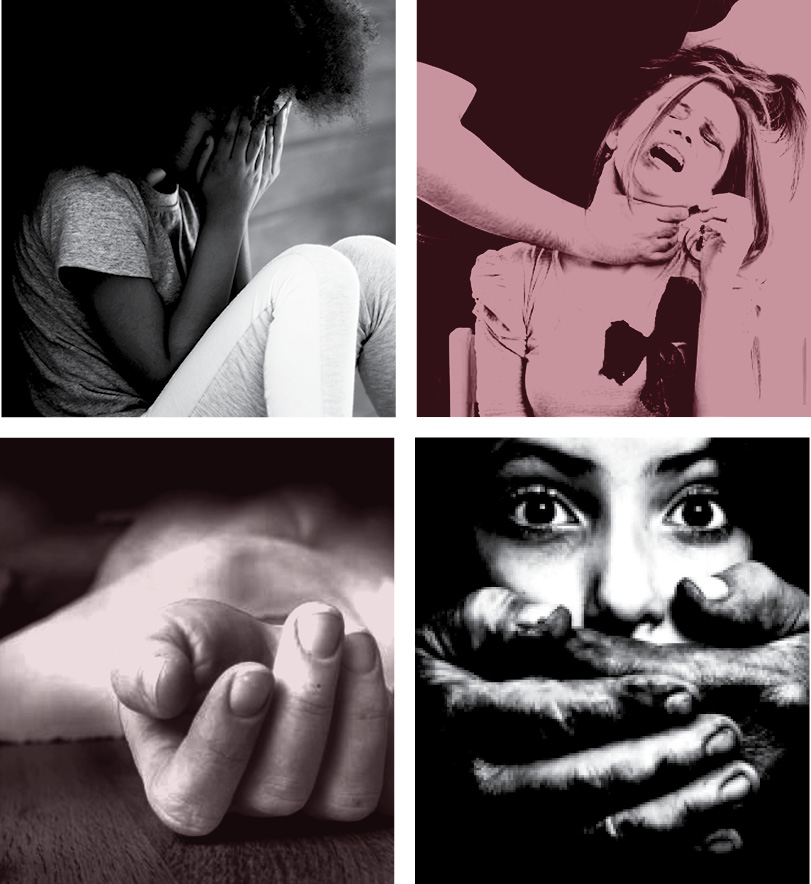 ender-based violence (GBV) has increased in the country amid the coronavirus (COVID-19) pandemic, which is affecting large parts of the world. This, the President said, means the country is waging a war on two pandemics.
ender-based violence (GBV) has increased in the country amid the coronavirus (COVID-19) pandemic, which is affecting large parts of the world. This, the President said, means the country is waging a war on two pandemics.
Addressing South Africans recently, President Ramaphosa expressed deep-felt regret at the recent wave of fatal attacks on women of all ages.
“As a man, as a husband and as a father, I am appalled at what is no less than a war being waged against the women and children of our country. At a time when the pandemic has left us all feeling vulnerable and uncertain, violence is being unleashed on women and children with a brutality that defies comprehension.
“These rapists and killers walk among us. They are in our communities.”
The perpetrators, the President said, are fathers, brothers, sons and friends. “[These are] violent men with utterly no regard for the sanctity of human life.”
21 women and children murdered
Over the past few weeks, 21 women and children have been murdered.
“Their killers thought they could silence them but we will not forget them, and we will speak for them where they cannot,” the President said, calling the victims by name.
They include Tshegofatso Pule, Naledi Phangindawo, Nompumelelo Tshaka, Nomfazi Gabada, Nwabisa Mgwandela, Altecia Kortjie and Lindelwa Peni - all young women who were killed by men.
“We will speak for the 89-year-old grandmother, who was killed in an old age home in Queenstown; the 79-year-old grandmother, who was killed in Brakpan and the elderly woman, who was raped in KwaSwayimane in KwaZulu-Natal.”
The President thanked the police for arresting almost all of the alleged perpetrators.
National Strategic Plan
In 2019, President Ramaphosa announced a R1.6 million Emergency Response Plan to combat gender-based violence and femicide. Government now has a National Strategic Plan to guide the country’s national effort against GBV.
During the lockdown period, government ensured that survivors of gender-based violence have access to support and services, including the GBV hotline, shelters and centres providing support to victims of sexual violence.
Since December last year, 10 government-owned buildings have been handed over to the Department of Social Development to be used as shelters, addressing one of the biggest challenges facing survivors who want to leave abusive relationships.
“Over the last 18 months, we have made demonstrable progress in broadening access to support for survivors,” said the President.
During this period, 13 regional courts were upgraded into sexual offences courts. Over 7 000 evidence collection kits have been distributed regularly to police stations across the country. Additionally, 1 000 survivor-friendly rooms at police stations have been made available.
“Many police, prosecutors, magistrates and policymakers have undergone sensitivity and awareness training, and over 3 000 government employees, who work with children and mentally disabled persons, have been checked against the National Register of Sex Offenders,” President Ramaphosa said.
The President said the country’s courts have been firm in dealing with cases of GBV, even during the lockdown period, handing down life sentences to perpetrators.
Alcohol as a contributor
According to the police, violent crime – especially murder and attempted murder – has increased dramatically since Alert Level 3 took effect on 1 June.
“We need to ask some very difficult questions of ourselves as a society. We need to examine the effect of alcohol abuse not only on levels of violence, but also on road accidents and reckless behaviour,” said President Ramaphosa.
He said if alcohol use and abuse is contributing to these crimes, then it must be addressed with urgency.
“We need to draw lessons from this lockdown and decide how we can protect our society from the abuse of alcohol. Certainly, we need to provide greater support to people with drinking problems, including through rehabilitation and treatment.”
The consequence of being silent
The President said if the country is serious about ending these crimes, people cannot remain silent any longer.
“These perpetrators are known to us and our communities. By looking away, by discouraging victims from laying charges, by shaming women for their lifestyle choices or their style of dress, we become complicit in these crimes.”
He called on South Africans to consider the consequence of their silence. – SAnews.gov.za
Mom with comorbidity beats COVID-19
Mom with comorbidity beats COVID-19 angenithaInsaaf Mohammed says it is very important for South Africans, especially those with comorbidities, to take responsibility for their health.
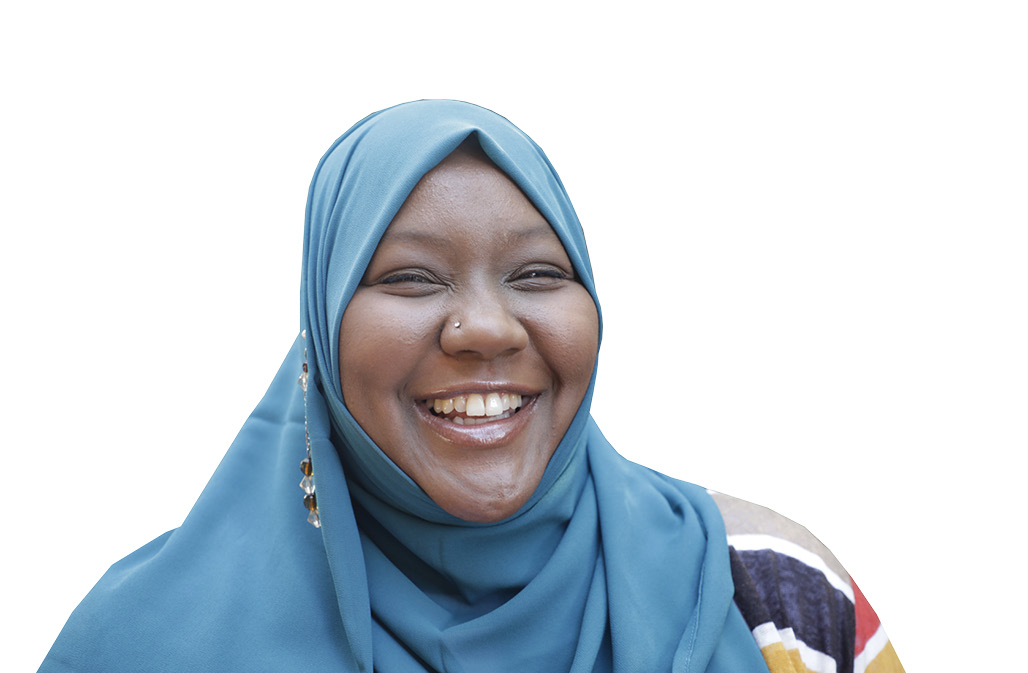
Fortunately, when Cape Town-based occupational therapist and mother of three Insaaf Mohammed (40) tested positive for COVID-19 while ill with asthma, she was able to manage both conditions and did not become seriously ill.
Mohammed contracted COVID-19 from her husband, who works at the Groote Schuur Hospital’s laboratory. Mohammed’s seven-year-old son also tested positive.
After testing positive, all three self-isolated at home. “We self-isolated in our bedroom, while my mother-in-law – who has diabetes and hypertension and thankfully didn’t contract the virus – took care of our other two children,” says Mohammed.
According to the Western Cape Department of Health, people with hypertension, diabetes and chronic kidney disease are among the most common comorbidity sufferers of COVID-19.
As of 25 May, people with the following comorbidities showed serious symptoms of COVID-19;
- Hypertension, 58 percent
- Diabetes, 56 percent
- Chronic kidney disease, 17 percent
- HIV, 16 percent
- Asthma or chronic respiratory disease, 15 percent
- Cardiac disease, 11 percent
- Obesity, 13 percent
- TB, 13 percent
- Cancer, two percent
- Other chronic illnesses, 16 percent.
Mohammed says her worst fear was experiencing serious respiratory complications from COVID-19.
“I experienced tiredness, coughing and tightness of the chest, which my asthma pump resolved. My symptoms were not as severe as my husband’s, who had body aches, nausea, a tight chest, shortness of breath, blocked sinuses, thick phlegm on his chest and a fever. My son had a fever for three days, but recovered quite fast once he overcame his symptoms,” she says.
Mohammed’s family had been following protocols at work and home, to avoid contracting the virus. “My family was understanding, caring and supportive, and brought us supper every evening, but sometimes your community can be uncaring and the harm caused on social media is scary,” says Mohammed.
The Western Cape Department of Health says that keeping hydrated and monitoring your blood glucose, blood pressure and temperature are key to managing COVID-19, especially for patients with comorbidities.
In addition, the department advises people with comorbidities to:
- Take medication correctly, as prescribed by your healthcare practitioner.
- Wash your hands with soap and water for at least 20 seconds, before you touch any medication.
- Do not stop taking medication unless a healthcare practitioner tells you to and never share medication with anyone.
- Try to do physical exercise for 30 minutes a day.
The department says that people with diabetes face a higher chance of experiencing serious complications from COVID-19, but the risk of getting very sick is lower if one’s diabetes is well managed.
“In general, people with diabetes are more likely to experience severe symptoms and complications when infected with a virus. As diabetic individuals are at increased risk of severe COVID-19, ongoing social or physical distancing is recommended where possible. Being overweight is also a risk factor for severe COVID-19. Weight loss, if possible, is therefore recommended.”
Clean bill of health
After being in isolation for 14 days, Mohammed returned to work. She says recovering from the virus changed her thought processes and perspective on life.
“You appreciate your family and the small things in life even more. I want people in any working environment to take responsibility for their health and to educate their families and children, especially now that kids are back at school.
“Help your child find creative ways to show affection to their friends, without going close and touching each other. Get your family to sterilise themselves before entering the home, leave your shoes in the garage if you can, take all your clothes off and shower before greeting your family and be more health conscious to protect them,” she says.
The department advises people with comorbidities to eat healthily, get regular exercise, manage their stress, adhere to their medical treatment plan and follow all necessary preventative measures.
*If you are showing any symptoms, such as a fever, cough, or shortness of breath, contact the COVID-19 hotline on 0800 029 999 or
WhatsApp the word ‘Hi’ to 0600 123 456.
More industries reopen
More industries reopen JoyThe public can now visit sit-down restaurants, casinos and accredited accommodation - under strict conditions - after being closed for over 80 days since the lockdown was announced in March Government is due to announce the date for reopening of these industries.
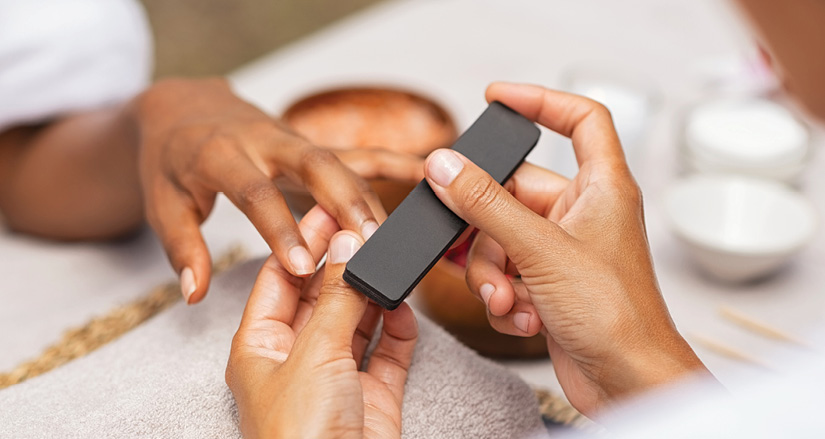 Personal care services such as salons and personal beauty services will also be permitted to offer their services, while sports lovers will soon be able to play contactless games, with some contact sport to be allowed with defined restrictions.
Personal care services such as salons and personal beauty services will also be permitted to offer their services, while sports lovers will soon be able to play contactless games, with some contact sport to be allowed with defined restrictions.
Addressing the nation recently, President Cyril Ramaphosa said many industries have been affected in the country and unable to earn a living.
“There are businesses that haven’t earned an income or revenue, and individuals who haven’t earned a salary for over 80 days, even with the measures we put in place to support companies, workers and poor households as part of the R500 billion relief package that we announced,” the President said.
When President Ramaphosa announced in May that the country would be moving to alert level 3 from 1 June, he said government would give consideration to re-opening other sectors of the economy, if the necessary safety precautions were put in place and maintained.
Industries open for business
- Restaurants for ‘sit-down’ meals.
- Accredited and licensed accommodation, except home-sharing accommodation like Airbnb.
- Conferences and meetings for business purposes and in line with restrictions on public gatherings.
- Cinemas and theatres, to be aligned to limitations on the gathering of people.
- Casinos.
- Personal care services, including hairdressers and beauty services.
- Non-contact sports such as golf, tennis, cricket and others.
- Contact sports will be allowed only for training and modified activities with restricted use of facilities.
“We have taken this decision with due care and seriousness, appreciating the risks associated with each activity and the measures needed to manage those risks,” said the President. SAnews.gov.za
Needy girls’ menstrual anguish eased
Needy girls’ menstrual anguish eased vuyelwanThe realisation that many rural girls miss school during their menstrual period led Nontokozo Keswa (37) to leave her job and start a sanitary pad company.
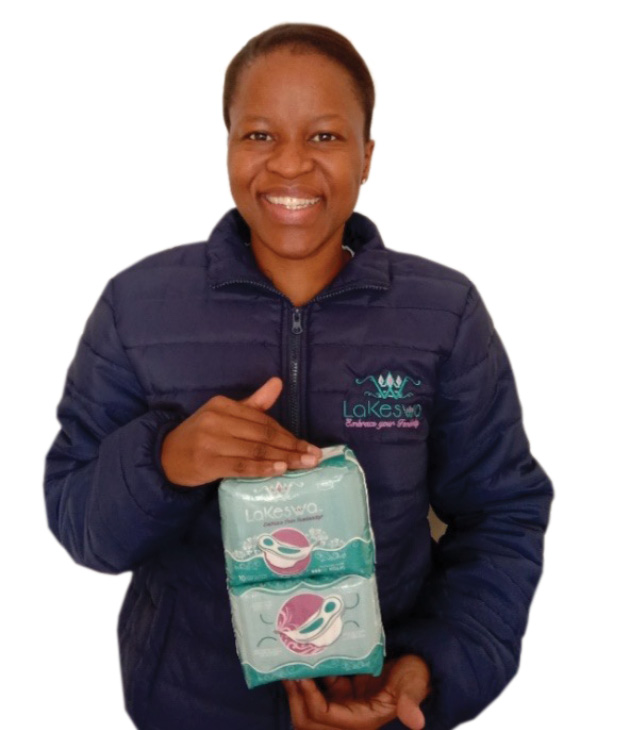 Born in Ladysmith, Keswa holds an accounting degree from the University of the Free State and has worked as a business studies lecturer, a budget accountant, assistant director for budgets, deputy manager for budgets and finance manager in various government spheres.
Born in Ladysmith, Keswa holds an accounting degree from the University of the Free State and has worked as a business studies lecturer, a budget accountant, assistant director for budgets, deputy manager for budgets and finance manager in various government spheres.
“I left formal employment in 2013 to start my company, LaKeswa, which supplies sanitary pads that are currently available in regular size for normal to medium flow and maxi for heavy flow,” she says.
“In 2013, I read about young girls missing school because they couldn’t afford sanitary pads. It pained me to learn that they were using newspapers and old cloths as sanitary pads. Some of the girls were forced to date older men so that they could afford toiletries and basic needs.
“I took a decision to do something to turn the situation around as much as I could,” she explains.
Initially, Keswa wanted to have her own manufacturing company but due to financial constraints, she opted to contract the services of a local factory that is SABS approved and black female-owned to manufacture and package the LaKeswa brand.
“At the moment, we supply as and when we get orders. Our products are currently available at Macksons stores in Ladysmith. We are in talks with other retailers to list with them. We also courier to customers that are outside of Ladysmith. We’re also in the process of making our pads available through online platforms, like Proudly South African’s www.rsamade.co.za,” she says.
The company also supplies a menstrual pain relief gel, which is currently only available through direct order from LaKeswa.
Keswa says she is proud to have been able to donate pads to girls in need over the years, in and around Ladysmith, those donations were sourced from other manufactures.
She believes no business is too small to help out in its community because every bit helps.
“A positive that came with the national coronavirus lockdown was the support we received from government departments like the Department of Small Business Development, which has been assisting us in supplying wholesalers, supermarkets and spaza shops,” she says.
The business has created four jobs so far and is in the process of recruiting its second set of interns from the Department of Trade, Industry and Competition, through its Itukise Internship Programme.
Contact LaKeswa on email hello@lakeswa.co.za or at 061 527 5445.
Protect your mental health during COVID-19
Protect your mental health during COVID-19 JoyWhile it’s natural to feel anxious about the coronavirus, help is on hand should you need it.
The coronavirus disease (COVID-19) has had a huge impact on citizens’ lives, bringing about fear and uncertainty and an increased risk of people suffering from mental health issues, such as depression and anxiety.
 According to Dr Pevashnee Naicker, a neuropsychiatrist at the Tara Psychiatric Hospital in Johannesburg, we should all focus on taking care of our mental well-being during this time as people are under an abnormal level of stress.
According to Dr Pevashnee Naicker, a neuropsychiatrist at the Tara Psychiatric Hospital in Johannesburg, we should all focus on taking care of our mental well-being during this time as people are under an abnormal level of stress.
A neuropsychiatrist is a psychiatrist who specialises in diagnosing and treating people who have sicknesses that affect the brain. The sickness may influence how a person behaves and their psychological well-being.
“With any change, we can expect a distress reaction from people, communities and society. And this is particularly true for this pandemic because it has caused such a big change in society,” she says.
Dr Naicker explains that people are fearful that they or their loved ones will get sick and that the lockdown may be resulting in a rise in stress in the home or at work.
“Many people may be in financial distress or stuck in a home environment where they are abused. There are a number of other stresses, such as having to care for children. And, in many cases, there may be a rise in substance abuse as people use negative coping skills to try and deal with increased stress.”
Find healthy ways to cope
Dr Naicker says that when people feelings of anxiety or depression, the first step they must take is to practise self-help techniques.
“You should practise healthy lifestyle behaviours, such as getting enough rest, exercising and having a healthy diet. You should also rely on your friends and family for support.
Dr Naicker adds that people should educate themselves about mental health and be aware of any symptoms that might become severe.
If things get bad, look for help.
Dr Naicker says that if your symptoms become severe, then you should seek professional help.
“If you’re feeling anxious, for example, and that turns into having panic attacks, then you should seek help. The same applies if you’re having negative thoughts that might turn into suicidal thoughts.”
She advises people to get help through platforms such as the South African Depression and Anxiety Group’s (SADAG) helpline.
“If you’re still struggling, then you should make an appointment to see your doctor or a mental health professional. Public facilities are open during this time.”
Advice from SADAG
SADAG has recorded an increased number of calls to its helpline from people experiencing anxiety and depression.
In an online survey, the group found that the following issues were the most commonly reported:
- Anxiety and panic (55 percent).
- Financial stress and pressure (46 percent).
- Depression (40 percent).
- Poor family relations (30 percent).
- Feelings of suicide (12 percent).
- Substance abuse (six percent).
SADAG clinical psychologist Dessy Tzoneva says that it is natural to feel concerned during this time.
"It’s natural to feel worried and overwhelmed about our safety and wellbeing. So, if you’re feeling concerned about the coronavirus, you’re not alone. Yet, for some of us, this concern can quickly grow into anxiety, even panic," says Tzoneva.
SADAG offers the following tips to manage stress and anxiety:
- Maintain a daily routine as much as possible.
- Limit the amount of time you spend watching the news or listening to the radio. Hearing too much negative news can cause you to feel even more distressed or anxious.
- Create a list of things you can do to keep busy, such as reading a book or trying out a new hobby.
- Don’t be afraid to speak up. If you feel like you are really struggling to cope, reach out to the SADAG, speak to friends or family or contact your therapist if you have one.
- Focus on the things you can control, such as thinking positively and keeping busy.
- Take the necessary steps to protect yourself from the coronavirus.
*If you or a loved one is struggling with mental health concerns, reach out to the SADAG for free telephonic counselling. Call 0800 21 22 23, 0800 70 80 90 or 0800 456 789.
SA youth are a source of inspiration and hope
SA youth are a source of inspiration and hope JoyThe words of Frantz Fanon that ‘each generation must discover its mission’ come to mind every time I have an opportunity to speak with young South Africans.
No matter where they live and no matter what they do, they each have a burning desire to change the world.
While they certainly want to improve their own lives, they also want to achieve a better society and a better world. They see themselves as agents for fundamental transformation.
Throughout history young people have been a driving force for change. In just the last few decades, young people have waged numerous struggles against injustice, from the 1968 student uprising in Paris, to the anti-war movement in the United States in the 1960s, to the anti-colonial struggle in many African and Asian countries, to the fight against apartheid, to the Arab Spring.
 Most recently, young people have been at the forefront of the #BlackLivesMatter movement that has gained global support in the wake of the killing of George Floyd in the United States.
Most recently, young people have been at the forefront of the #BlackLivesMatter movement that has gained global support in the wake of the killing of George Floyd in the United States.
Over the past few weeks, activists around the world have also been demanding the removal of symbols that glorify the barbarity and violence of the slave trade and colonialism.
At an Oxford University demonstration recently a protestor carried a placard with the words ‘Rhodes must Fall’, the rallying cry of students in our own country five years ago.
Young people across the world have found common cause. They are tearing down statues and symbols of racism, demanding the decolonisation of educational curricula, and calling for institutions to address racism and social exclusion.
And so, as we paid tribute to the generation of 1976 on 16 June 2020, we also salute the youth of post-apartheid South Africa, the worthy inheritors of this noble legacy.
The mission of 1976 generation was to dismantle bantu education; that of today’s youth is to take forward the project of national reconciliation and transformation.
In time to come it will be said that this year, 2020, marked the start of a new epoch in human history.
Not only has coronavirus had a momentous impact on people’s lives and livelihoods, it has also shaken up the global social order.
The manner in which the pandemic has taken hold has been a reminder of the interconnectedness of the human race and of the deep inequalities that exist between countries and within countries.
The pandemic presents an opportunity to ‘reset’ a world that is characterised by crass materialism, selfishness and self-absorption not just on the part of individuals but whole societies.
Young people are telling us that the essential values of integrity, compassion and solidarity must be the hallmarks of the new society that will emerge, and that they are determined to be the champions of this new, better world.
In the discussions I have had with young people I have said that we should never underestimate the power of an idea, because ideas can and have changed the world. Ideas have spurred human progress and they are what will enable us to chart a new path in the post-coronavirus era.
These young people have turned their ideas into action. They have not let a lack of resources hinder them. They have carved a niche for themselves in a number of sectors from high-tech to environmental sustainability.
Now more than ever we will look to the innovative and pioneering spirit of our youth to come up with solutions to the unemployment crisis that benefit them, their communities and society.
At the same time, I challenge our country’s youth to craft and design programmes that will enable us to meet our developmental goals.
In 1961, revolutionary Cuba sent legions of young student volunteers into the mountains and villages to construct schools, teach literacy and train new educators. It is still held up as one of the most successful literacy campaigns in modern history.
Our young people must develop social upliftment initiatives and they must lead them.
Just as they took up the struggle for equality in higher education, the considerable energies of our youth must also be brought to bear to fight for equitable access to health care, for the transformation of land ownership and, most importantly, for gender justice.
Like all South Africans, I have been deeply disturbed by a surge in the murder of young women at the hands of men. These are shocking acts of inhumanity that have no place in our society.
Youth-led civic activism, awareness raising and peer counselling are vital tools in our efforts to eradicate gender-based violence from society. At the same time, we must strengthen our justice system, ensuring that perpetrators are brought to book, bail and parole conditions are tightened and that those sentenced to life spend the rest of their lives behind bars.
While this needs society-wide action, I call on young men in particular to take up the struggle against gender-based violence. Unless we end the war that is being waged against South African women, the dream of a new society will remain elusive.
Those of us who were part of student movements during the apartheid era are often asked what we think of the young people of today. There is a temptation to retreat into nostalgia about ‘the glory days’ of student politics and youth struggle, never to be replicated.
But just as the youth of yesteryear defined their mission, today’s youth have defined theirs.
South African youth of 2020 more than meet the high standard set by their predecessors. They are optimistic, resilient and courageous, often in the face of the harshest of circumstances.
They are a source of inspiration and hope. Through their actions, they are building a world that is more just, equal, sustainable and at peace.
Speak up to keep our children safe
Speak up to keep our children safe vuyelwanNon-governmental organisations have a responsibility to report any at-risk or abandoned children to the authorities, so that they can get the help they need.
The Department of Social Development has appealed to people and organisations that work closely with children to report all cases of child abuse, neglect, abandonment and exploitation.
Children may be at an increased risk of abuse and abandonment during the coronavirus lockdown as some parents and caregivers are struggling to find the means to meet their family’s basic needs.
The department says cases must be reported to a designated child protection organisation, the provincial department of social development, local social worker or a police official, as mandated by Section 110 of the Children’s Act (Act No 38 of 2005).
This will ensure that, if warranted, the details of vulnerable children are recorded in Part A of the Child Protection Register and receive the help they need.
The Act further states that the Department of Social Development must assess and further manage the situation in the best interests of the child.
In the case of an abandoned child, a social worker must gather all necessary information and affidavit/s from the person/s who found or reported the child as abandoned and report the case to the police for investigation.
The department explains that matters relating to child and spousal maintenance proceedings; child abuse, neglect and exploitation – including child abandonment; foster care applications and hearings; international child abduction cases and adoptions and hearings are prioritised.
What to do if you cannot care for your baby
A pregnant mother who wants to discuss the possibility of putting her baby up for adoption should contact their area social worker or the nearest Department of Social Development office.
Despite adoption services being readily available, the abandonment of infants in South Africa is unfortunately a common occurrence. It is for this reason that organisations such as Door of Hope Children’s Mission in Johannesburg, Shepherd’s Keep in Durban and Ubuntu House in Cape Town exist. They offer a safe drop-off point for unwanted babies.
For more information, call Door of Hope at 082 783 3374, Shepherd’s Keep at 031 466 1045 or 084 581 2453 or Ubuntu House at 021 592 0610.
Steroid could be key to COVID-19 treatment
Steroid could be key to COVID-19 treatment angenithaA potential coronavirus disease (COVID-19) treatment might soon be made available in South Africa after dexamethasone was shown in clinical trials to reduce deaths among patients on ventilators.
The drug, a widely used, affordable steroid, is generally used to treat inflammation, allergic reactions, asthma and leukaemia.
President Cyril Ramaphosa says a study found that the drug reduced deaths of patients on ventilators by a third. The study was conducted by the University of Oxford in England.
“The Department of Health and the Ministerial Advisory Committee has recommended that dexamethasone be considered for use on patients on ventilators and on oxygen supply. We believe that this will improve our management of the disease among those who are most severely affected,” said President Ramaphosa recently.
The widely available drug is made in South Africa by the Aspen pharmaceutical company and can be bought for about R150 to R170. Pharmaceutical giants Adcock Ingram and Sanofi are registered distributors of the drug.
World Health Organisation Director-General Tedros Ghebreyesus says dexamethasone is the first drug that shows signs of reducing the number of deaths among COVID-19 patients who have been placed on oxygen or ventilator support.
Support for village and township businesses
Support for village and township businesses vuyelwanGovernment steps in to help small businesses in townships and villages recover from the impact the impact of the coronavirus.
As the economy reopens following the strict coronavirus (COVID-19) lockdown, the Department of Small Business Development will financially support informal, micro and small enterprises operating in the textile, bakery and automotive sectors.
The department has launched the small-scale bakeries and confectioneries; informal and small-scale clothing and textile; and automotive aftermarkets support schemes as part of its Township and Rural Entrepreneurship Programme.
“With the reopening of the economy, township and village economies require special focus if government is to achieve the aspirations of the new economy post-COVID-19,” says Minister of Small Business Development Khumbudzo Ntshavheni. 
The informal and small-scale clothing and textile support scheme will help seamstresses, sewers, dressmakers and tailors, patternmakers, designers, pattern calculators, pattern cutters, art designers, knitters, machinists, tanners, fabric manufacturers, shoe makers and handbag makers.
The small-scale bakeries and confectioneries support scheme will support micro or informal businesses in the sector, by helping them buy equipment and providing them with working capital; while the automotive aftermarkets support scheme will fund panel beaters who operate accredited small and independent motor body repair businesses; qualified motor mechanics who run authorised service centres; small or independent auto-spares shops that sell aftermarket car spare parts; and informal and formal micro fitment centres.
Minister Ntshavheni says: “The scheme covers the cost of production inputs; access to credit; assistance with compliance and technical skills improvement, such as labelling, industry standards and quality; and business and financial management training, including productivity management.”
Businesses applying to the automotive aftermarkets support scheme will participate in a Small Enterprise Development Agency-facilitated trade test certification and receive assistance to enrol with the insurance industry and car service centres, among other benefits.
For a business to qualify for funding from any of these schemes, it must be based in a village or township. In addition, it must:
- be registered with the Companies and Intellectual Property Commission,
- be 100 percent owned by South Africans,
- be registered or apply for registration with the South African Revenue Service and the Unemployment Insurance Fund,
- have a valid business bank account or be willing to open one, and
- ensure its workers are 70 percent South Africans. In the case of non-South African employees, they must have valid work permits as determined by the Department of Home Affairs.
Application forms and further information is available online at www.smmesa.gov.za.
Taxi driver pleads with citizens to fight COVID-19
Taxi driver pleads with citizens to fight COVID-19 vuyelwanThe taxi industry has been hit hard by the country’s coronavirus regulations that limit the number of passengers they are able to transport per trip.
Teboho Tladi (38) is pleading with citizens to play their part in combating the spread of the coronavirus disease (COVID-19), so that taxi operations can go back to normal and he can provide for his family.
The Pretoria-based taxi driver, who has been in the business for 13 years, says this is the first time he has felt such a knock on his finances.
He transports commuters between Mahem in Hercules and Pretoria’s central business district.
“Due to observing lock-down regulations as a taxi driver, I no longer make enough money. Business is suffering. I used to fill the 15-seater taxi, but now I can only take a maximum of 10 people per load. Also, not many people are using taxis because they have been advised to minimise their movement,” he says.
“Before the lockdown, I would make at least R1 000 per day, but now I only manage to make R400 or less per day. On top of this, I still have to buy fuel for the vehicle and try to make money for the owner as well,” he says, explaining that it’s difficult to make ends meet.
Some taxi owners have agreed with drivers to decrease their targets. “They are aware of what is happening and how the industry is affected. The agreement is between the driver and the owner, and I cannot speak for other people,” he says.
The financial burden is heavy on Tladi, especially when it comes to paying his rent. “One of the things that helps is that my three children are not going to school and are learning from home. So, I use some of the money I would have used for their educational needs to take care of other household needs, including rent. My wife and I add our income together so that we can survive,” he says.
Although Tladi is uncertain about what the future holds for the industry, he psays everyone must follow government’s guidelines to fight the spread of COVID-19 so that he can start loading the taxi to its full capacity again.
He also says help from government would help him and his colleagues to provide for their families.
Transport Minister Fikile Mbalula recently announced that government is working on a relief fund for the taxi industry.
“These funds are to assist the industry. They cannot replace the losses that operators have incurred as a result of COVID-19,” the Minister says.
What would people have said?
What would people have said? vuyelwanPolice: 10111
Stop Gender Violence: 0800 150 150
Childline: 0800 055 555
There is no excuse for abuse.
People can only help if they know. TELL SOMEONE.
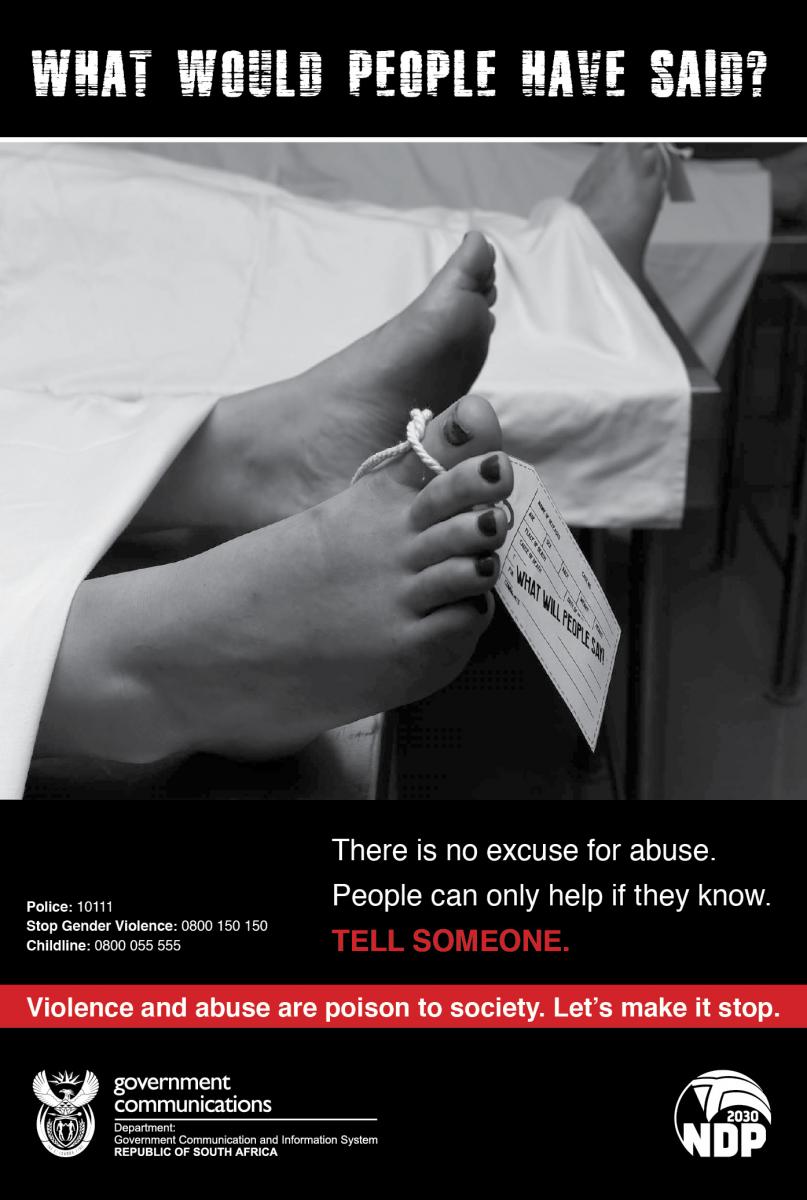
Young social worker ready to fight abuse
Young social worker ready to fight abuse angenithaLesego Mocumi (25) of Bloemfontein in the Free State says experiencing domestic violence first-hand as a child motivated him to become a social worker.
Mocumi is one of almost 100 newly appointed social workers who, along with 533 nurses, now work for the provincial government. They have been tasked with combatting the coronavirus (COVID-19) and other health risks and social ills. 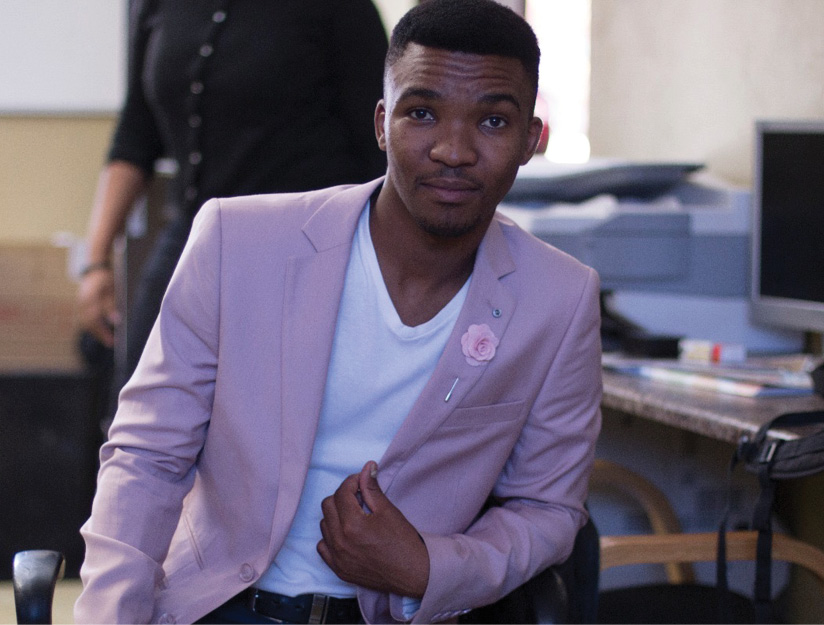
“I chose this career consciously, knowing that God has given me purpose – to be a source of help in other people’s lives. I deal directly with people who need their hope to be restored because their rights have been violated,” he says.
He obtained his social work qualification in 2018 and before accepting this new position, volunteered as a radio presenter at a local radio station and also at a local non-profit organisation, which later offered him a four-month internship.
“I got exposure and experience while working with the organisation. Surprisingly, a few days after my contract with the organisation expired, I received the news about my appointment as a social worker for government,” he says.
Mocumi is determined to help those who are experiencing violence and abuse in their homes.
“Gender-based violence (GBV) is also a pandemic. I encourage members of the community to speak out. Being silent when you see other people being victimised and abused is as good as a criminal act because you are indirectly promoting acts of abuse,” he says.
Mocumi also encourages victims of GBV to find the strength to speak out. “You need to prioritise your life and ask for help,” he says.
Perpetrators also need to ask for help to address the frustrations and issues that make them abusive. “There is another way of resolving issues, apart from violence,” he says.
As a child, seeing a loved one being abused was horrible for Mocumi because there was nothing he could do to help.
“I had no strength to fight back. It was brutal. I believe I was broken inside. Until I met Christ who changed my life and that of my family, and now we are at peace. It was not a healthy environment for children to witness abuse. However, I have healed over time. My parents have also made peace and are at peace, and they are living in harmony with one another,” he says.
He said abuse should not be justified. Men should not abuse women and children. No one has a right to lay a hand on another person.
“Abuse is dehumanising women and children. I cherish the presence of women anywhere because they bring warmth and love wherever they are. Killing them is like taking our own lives as men,” he says.
According to Mocumi, men should also tell their stories and look for professional help in order to stop their abusive behavior.
Youth must lead post COVID-19 ICT
Youth must lead post COVID-19 ICT vuyelwanWorking remotely opened new opportunities for a youth led ITC business.
An information and communication technology (ICT) company is spreading its wings after realising that the coronavirus (COVID-19) will force people to work from home a lot more.
Cape Town-based Uni Networks, owned by Ashton Murungweni and Dyke Kangoma, provides data cabling, voice-over internet protocol solutions, fibre installation, wireless internet installation and the management of ICT services for companies.
Murungweni says that there is a need for greater ICT connection as companies navigate the era of COVID-19. He says: “People need to be connected more than ever, especially those working from home.”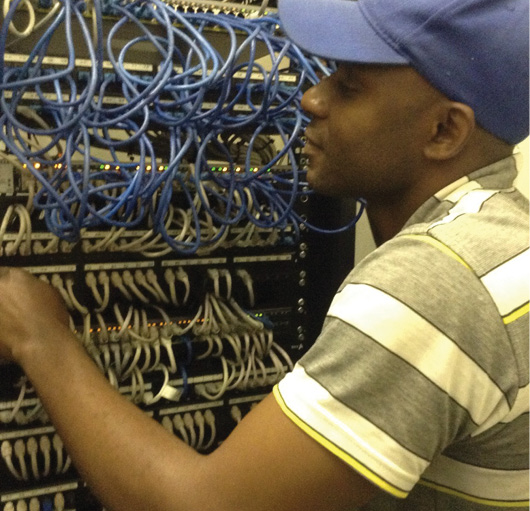
He believes that even companies that are returning to the office need wireless workstations to better adhere to social distancing.
Murungweni says they are helping businesses adapt to the new workplace procedures.
Uni Network was affected at the start of the lockdown because its core function is physical installations. However, it adapted and offered advisory services to clients, which resulted in a few income opportunities, such as creating or updating clients’ databases.
The company, which was started in 2014 by a group of 10 technicians, employs six people who have been with them from the start. An additional four people also work for the company on a part-time basis and when needed, more people are contracted in.
According to Murungweni, the technicians had been working individually on an informal level before deciding to combine their skills and offer a one-stop shop for all ICT-related projects.
He says they helped each other grow as entrepreneurs while maintaining the flexibility needed for them to continue pursuing other business interests.
“Entrepreneurship was the principal reason for starting Uni Networks. After gaining some experience, we felt that there were market gaps that we could tap into as young entrepreneurs. The organisation we were working for was not keen on diversifying their services, hence limiting the growth of individuals,” he says.
Murungweni says that young people should be in charge of the ICT sector because they already possess the basic skills of the industry. “ICT is a broad sector and most youth have basic ICT skills.”
He says that big ICT companies and the government need to deepen their efforts to develop the youth’s skills in emerging technologies like online 3D production, robotics, and e-health.
Youth must lead post COVID-19 ICT
Youth must lead post COVID-19 ICT angenithaWorking remotely opened new opportunities for a youth led ITC business.
Cape Town-based Uni Networks, owned by Ashton Murungweni and Dyke Kangoma, provides data cabling, voice-over internet protocol solutions, fibre installation, wireless internet installation and the management of ICT services for companies.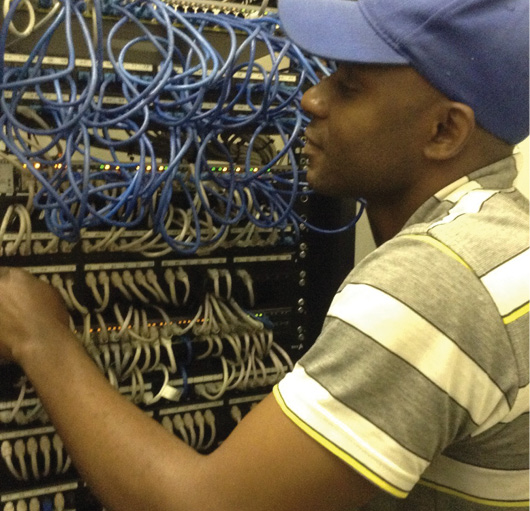
Murungweni says that there is a need for greater ICT connection as companies navigate the era of COVID-19. He says: “People need to be connected more than ever, especially those working from home.”
He believes that even companies that are returning to the office need wireless workstations to better adhere to social distancing.
Murungweni says they are helping businesses adapt to the new workplace procedures.
Uni Network was affected at the start of the lockdown because its core function is physical installations. However, it adapted and offered advisory services to clients, which resulted in a few income opportunities, such as creating or updating clients’ databases.
The company, which was started in 2014 by a group of 10 technicians, employs six people who have been with them from the start. An additional four people also work for the company on a part-time basis and when needed, more people are contracted in.
According to Murungweni, the technicians had been working individually on an informal level before deciding to combine their skills and offer a one-stop shop for all ICT-related projects.
He says they helped each other grow as entrepreneurs while maintaining the flexibility needed for them to continue pursuing other business interests.
“Entrepreneurship was the principal reason for starting Uni Networks. After gaining some experience, we felt that there were market gaps that we could tap into as young entrepreneurs. The organisation we were working for was not keen on diversifying their services, hence limiting the growth of individuals,” he says.
Murungweni says that young people should be in charge of the ICT sector because they already possess the basic skills of the industry. “ICT is a broad sector and most youth have basic ICT skills.”
He says that big ICT companies and the government need to deepen their efforts to develop the youth’s skills in emerging technologies like online 3D production, robotics, and e-health.
Youth upholding the values of Madiba
Youth upholding the values of Madiba vuyelwanWith the world celebrating Nelson Mandela Day in July, Vuk’uzenzele spoke to youth ambassadors of the Nelson Mandela Children’s Parliament to find out how they are upholding the values of the late former President.
Mpumalanga - Buhle Mathebula (15)
“Being a child ambassador means being passionate about issues that affect children, using my voice to speak on behalf of other children and advocating for children’s rights.
“To uphold Madiba’s legacy, I volunteer my time to give extra classes for learners in lower grades.
“My message to South Africans is that they should not wait for Mandela Month to celebrate President Mandela’s life and legacy, but rather do the little they can every day to help people in need in their communities.”
Limpopo - Tshepang Mahladisa (17)
 “I am also an ambassador of Save the Children, which is a non-profit organisation that creates a platform for children and youth to speak on issues that affect them.
“I am also an ambassador of Save the Children, which is a non-profit organisation that creates a platform for children and youth to speak on issues that affect them.
“To pay tribute to Nelson Mandela’s life, I facilitate various projects to equip children with leadership skills.”
North West - Otshepeng Babeile  (15)
(15)
“I am in the process of registering my own non-profit organisation in Mafikeng, which will help children with information about their rights because most children in my community are not empowered.
“To uphold Madiba’s legacy, I promote education because he believed in using education to fight poverty. My friend and I offer extra classes to younger children.”
Gauteng -  Thato Mhlungu (16)
Thato Mhlungu (16)
“We need our leaders and adults to acknowledge children’s voices. I work with Save the Children and as part of upholding the values of President Mandela, I advocate to give children from all walks of life a voice to speak out on issues that affect them.”
Western Cape -  (17)
(17)
“I use my ambassador status to speak directly, on behalf of my peers, to those in charge, such as to government ministers.”
Eastern Cape -Simamkele Jack (17)
 “The coronavirus pandemic is proof that people need to have ubuntu, now more than ever. As part of upholding the values of President Mandela, I advocate for proper sanitation in Eastern Cape schools.”
“The coronavirus pandemic is proof that people need to have ubuntu, now more than ever. As part of upholding the values of President Mandela, I advocate for proper sanitation in Eastern Cape schools.”
Northern Cape – Ceyzsar Limburg (17)
“I advocate for my community to work with government to solve problems that the youth face, especially issues that arise at Floors Secondary School. As South Africans, we must take the initiative in improving our own lives.” 